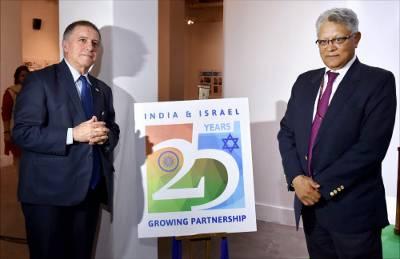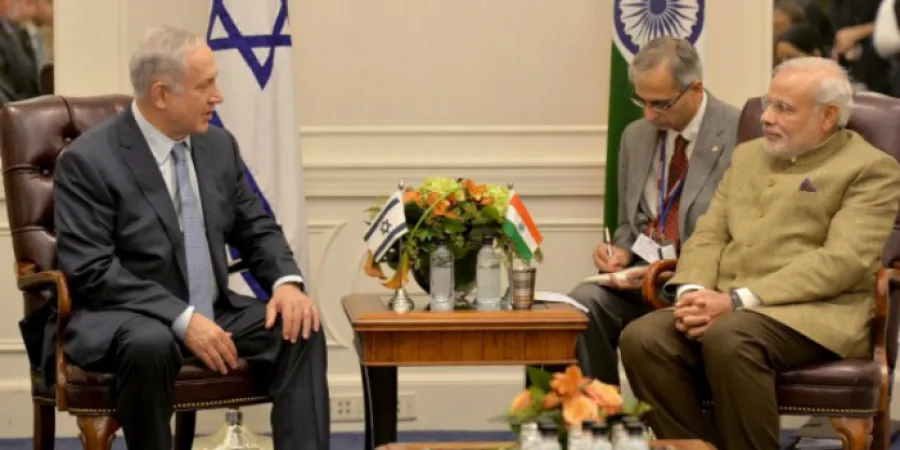How Will PM Modi's Visit Affect the Israeli Cybersecurity Industry?
According to Israel’s ambassador to India Daniel Carmon, the scheduled visit of the Indian Prime Minister will help to attract businesses to Israel, where they can engage in "creating partnerships with our laboratories which are world renowned for their innovation"
IsraelDefense
| 19/06/2017
The planned visit of India's Prime Minister Narendra Modi to Israel in July, the first by an Indian prime minister, will send a very strong message as the two countries are hoping to put in place a partnership traversing traditional and newer areas of interest, Israel’s ambassador to India Daniel Carmon told The Economic Times.
The ET website provides excerpts from the interview with Ambassador Carmon:
How significant do you think is Prime Minister Narendra Modi’s upcoming trip to Israel?
"Twenty-five years ago, when Indo-Israeli diplomatic ties were established, relations were characterized by the limited scope of activities. There was always curiosity and eagerness to do further. Today relations have reached a stage where it is being demonstrated and talked openly. Relations have progressed from scratch to partnership.
"There is a confidence in bilateral ties, be it in defense sector or among diplomats of both countries. PM Modi’s proposed trip is one of the important visits that Israel has witnessed in the last few years.
"The visit in itself sends a strong message. In Israel, we are today looking more towards east, not just west. We have realized the importance of that. India too has realized that nonalignment is not only the only game in the world either. So, it’s the meeting of two vectors. The PM’s visit also sends a political message to businessmen to learn more about Israel, to do more business with Israel.
"It is not just about buying and selling, it is about creating partnerships with our laboratories which are world renowned for their innovation. In fact, India and Israel can even think of putting in a place a mechanism like Indo-German Inter-Governmental Consultations led by respective PMs and comprising ministers. Israel has such arrangements with countries in Eastern Europe and the Mediterranean."

Ambassador Carmon with Indian foreign ministry's secretary for economic relations Amar Sinha
What are the big-ticket agreements that could be concluded during the PM’s trip?
"There have been several visits in the run-up to the PM’s trip to prepare for the visit. The two sides are focusing on certain sectors where we can expect concrete outcomes during the trip. The list includes development, innovation (including IT and cybersecurity), water, agriculture and people-to-people contacts (cultural linkages, tourism).
What are the new areas of cooperation that India and Israel plan to put in place during this trip?
"Israel is well aware of its strengths and limitations. We exactly know what we can offer. We are ready to offer India concepts across high-end technology and innovation, sectors where Israel has achieved considerable success.
"Israel is the original startup nation and the cell phones that we all use have many components developed in Israel. Israel has several 'cyber cities' which, among other sectors, focus on agriculture and water besides cybersecurity. Israel is ready to offer high-tech solutions across sectors to India. Each university of Israel has a transfer of technology cell and this can lead to mutually beneficial partnership with India.
Do you expect expansion of counterterrorism and defense partnership?
"The confidence and trust is reflected from the fact that Israel came forward to India’s assistance during the Kargil war. The defense partnership has been growing under the 'Make in India' initiative. Some projects are in the pipeline and could be in place by the end of the year."
According to Israel’s ambassador to India Daniel Carmon, the scheduled visit of the Indian Prime Minister will help to attract businesses to Israel, where they can engage in "creating partnerships with our laboratories which are world renowned for their innovation"
The planned visit of India's Prime Minister Narendra Modi to Israel in July, the first by an Indian prime minister, will send a very strong message as the two countries are hoping to put in place a partnership traversing traditional and newer areas of interest, Israel’s ambassador to India Daniel Carmon told The Economic Times.
The ET website provides excerpts from the interview with Ambassador Carmon:
How significant do you think is Prime Minister Narendra Modi’s upcoming trip to Israel?
"Twenty-five years ago, when Indo-Israeli diplomatic ties were established, relations were characterized by the limited scope of activities. There was always curiosity and eagerness to do further. Today relations have reached a stage where it is being demonstrated and talked openly. Relations have progressed from scratch to partnership.
"There is a confidence in bilateral ties, be it in defense sector or among diplomats of both countries. PM Modi’s proposed trip is one of the important visits that Israel has witnessed in the last few years.
"The visit in itself sends a strong message. In Israel, we are today looking more towards east, not just west. We have realized the importance of that. India too has realized that nonalignment is not only the only game in the world either. So, it’s the meeting of two vectors. The PM’s visit also sends a political message to businessmen to learn more about Israel, to do more business with Israel.
"It is not just about buying and selling, it is about creating partnerships with our laboratories which are world renowned for their innovation. In fact, India and Israel can even think of putting in a place a mechanism like Indo-German Inter-Governmental Consultations led by respective PMs and comprising ministers. Israel has such arrangements with countries in Eastern Europe and the Mediterranean."

Ambassador Carmon with Indian foreign ministry's secretary for economic relations Amar Sinha
What are the big-ticket agreements that could be concluded during the PM’s trip?
"There have been several visits in the run-up to the PM’s trip to prepare for the visit. The two sides are focusing on certain sectors where we can expect concrete outcomes during the trip. The list includes development, innovation (including IT and cybersecurity), water, agriculture and people-to-people contacts (cultural linkages, tourism).
What are the new areas of cooperation that India and Israel plan to put in place during this trip?
"Israel is well aware of its strengths and limitations. We exactly know what we can offer. We are ready to offer India concepts across high-end technology and innovation, sectors where Israel has achieved considerable success.
"Israel is the original startup nation and the cell phones that we all use have many components developed in Israel. Israel has several 'cyber cities' which, among other sectors, focus on agriculture and water besides cybersecurity. Israel is ready to offer high-tech solutions across sectors to India. Each university of Israel has a transfer of technology cell and this can lead to mutually beneficial partnership with India.
Do you expect expansion of counterterrorism and defense partnership?
"The confidence and trust is reflected from the fact that Israel came forward to India’s assistance during the Kargil war. The defense partnership has been growing under the 'Make in India' initiative. Some projects are in the pipeline and could be in place by the end of the year."



